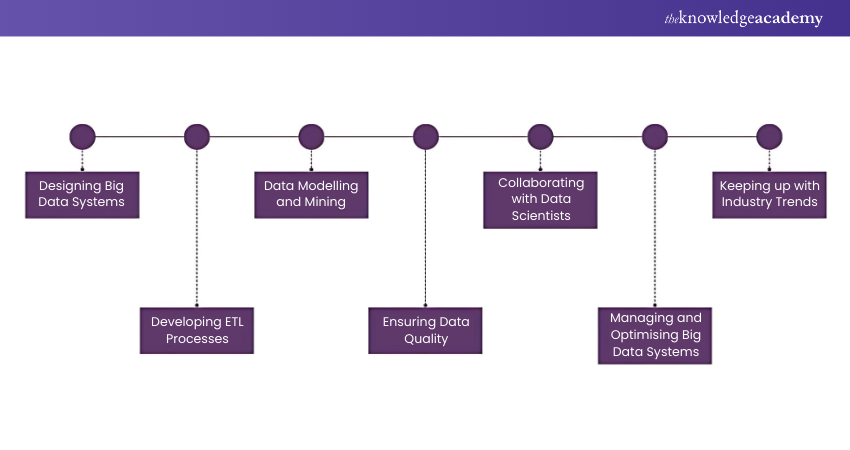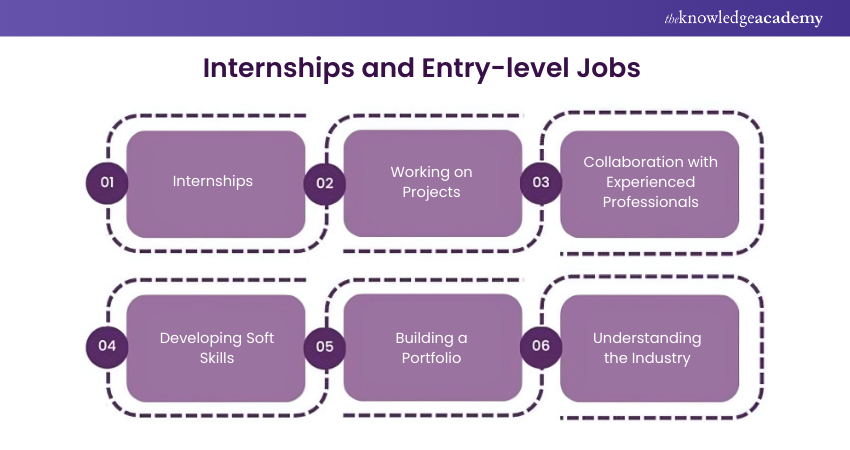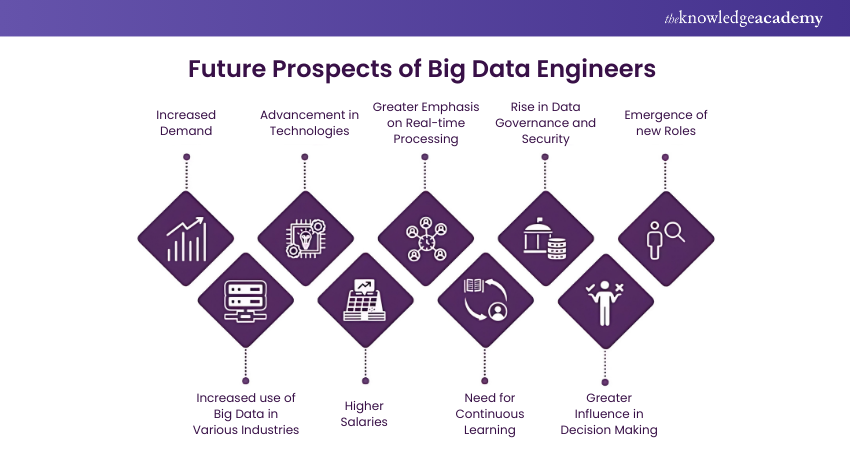We may not have the course you’re looking for. If you enquire or give us a call on 01344203999 and speak to our training experts, we may still be able to help with your training requirements.
We ensure quality, budget-alignment, and timely delivery by our expert instructors.

Curious about How to Become a Big Data Engineer? These skilled professionals are the masterminds behind the systems that process and analyse vast datasets. With the global Big Data Analytics market projected to surge to over 81 billion GBP by 2029 (Statista), their expertise is increasingly in demand. This rapid growth highlights how Big Data is revolutionising organisational operations and decision-making.
Eager to step into this exciting field but unsure where to start? Dive into our blog on How to Become a Big Data Engineer. We’ll explore the pivotal roles, attractive salaries, essential skills, and the steps to kickstart your career in this dynamic and transformative industry.
Table of Contents
1) Introduction to Big Data
2) Who is a Big Data Engineer?
3) What is the Role of a Big Data Engineer?
4) Big Data Engineer Skills
5) How to Become a Big Data Engineer?
6) Future Prospects of Big Data Engineers
7) A Brief Look at the Salaries of Big Data Engineers
8) Conclusion
Introduction to Big Data
Before diving into How to Become a Big Data Engineer, it's essential to understand the term ‘Big Data.’
In the early 2000s, data generation was relatively limited. However, with the rise of social media platforms and multinational corporations, data generation has surged exponentially. According to Statista, global data volume is projected to reach 180 zettabytes by 2025—a staggering amount.
Here are the different types of Big Data:
a) Structured Data
b) Unstructured Data
c) Semi-structured Data
Big Data refers to enormous datasets that are too large to be stored, processed, and analysed using traditional methods. To manage Big Data, frameworks like Hadoop, Spark, Cassandra, and Apache Storm are employed.
Big Data Engineers use these frameworks to handle and analyse massive datasets. Now, let's explore the role of a Big Data Engineer and how to pursue this career path.

Who is a Big Data Engineer?
A Big Data Engineer is a professional responsible for developing, maintaining, testing, analysing, and evaluating a company's data systems. Big Data refers to extremely large data sets that companies commonly collect during their business operations.
When used effectively, Big Data can significantly enhance an organisation's efficiency, profitability, and scalability. However, without a Big Data Engineer to build systems for collecting, maintaining, and extracting data, the potential benefits of Big Data remain untapped. Thus, Big Data Engineers play a crucial role in helping companies manage and leverage their Big Data for maximum advantage.
What is the Role of a Big Data Engineer?
As an essential part of a data-focused organisation, a Big Data Engineer holds an array of responsibilities. Below, we provide a breakdown of these key responsibilities, including the design, development, and implementation of robust and scalable data pipelines for various Data Engineering Projects:

a) Designing Big Data Systems: The primary role of a Big Data Engineer is to design and build the infrastructure needed to store and process Big Data. This includes selecting appropriate technologies, crafting the overall architecture, and ensuring the system can scale to handle large volumes of data.
b) Developing ETL Processes: A crucial task involves creating and managing ETL (Extract, Transform, Load) processes. These processes ensure that data is effectively extracted from various sources, transformed into a suitable format, and loaded into databases for analysis.
c) Data Modelling and Mining: Big Data Engineers are responsible for designing data models that define the relationships between different data types. They also perform data mining to uncover hidden patterns and insights within massive datasets.
d) Ensuring Data Quality: The value of Data Analysis depends heavily on data quality. Big Data Engineers develop and implement data quality checks and monitoring strategies to ensure data integrity and accuracy.
e) Collaborating with Data Scientists: Working closely with Data Scientists, Big Data Engineers provide efficient, reliable access to data. They assist in optimising algorithms for performance and scalability, facilitating better analysis and insights.
f) Managing and Optimising Big Data Systems: Ongoing management of Big Data systems is essential. This includes ensuring system security, reliability, and performance, as well as continually optimising systems as data volumes grow and business needs evolve.
g) Keeping up with Industry Trends: Staying updated with the latest industry trends and technologies in Big Data is vital. This helps Big Data Engineers incorporate advancements into their work, enhancing system performance and process efficiency.
Acquire the knowledge to install, configure and navigate a Big Data platform, by signing up for our Hadoop Big Data Certification now!
Big Data Engineer Skills
To succeed as a Big Data Engineer, one must possess a robust combination of technical skills, analytical abilities, and an innovative mindset. Below are the key skills that one should acquire:
a) Programming Skills: Proficiency in programming languages like Java, Python, or Scala is crucial. These languages are extensively used in Big Data processing and analytics.
b) Knowledge of Big Data Technologies: Familiarity with Big Data technologies such as Hadoop, Spark, and Kafka is essential. These tools are vital for storing, processing, and analysing vast amounts of data.
c) Database Management: Expertise in SQL for managing relational databases and an understanding of NoSQL databases like MongoDB, Cassandra, or HBase is necessary for handling both structured and unstructured data.
d) ETL Tools: Proficiency in ETL (Extract, Transform, Load) tools is critical for managing data extraction, transformation, and loading processes efficiently.
e) Data Mining and Processing: Strong skills in data mining and processing are required to extract valuable insights from large data sets.
f) Data Modelling and Architecture: Knowledge of Data Modelling and designing data architectures enables a Big Data Engineer to structure and define data relationships effectively.
g) Analytical Abilities: Big Data Engineers need strong analytical skills to understand complex data and convert it into actionable insights.
h) Problem-solving Skills: Excellent problem-solving skills are essential for troubleshooting issues and devising efficient solutions to data-related challenges.
i) Understanding of Machine Learning: A basic understanding of Machine Learning algorithms can be beneficial in designing more effective data processing systems, although it is not a strict requirement.
j) Soft Skills: Soft skills such as communication and teamwork are equally important. These skills help in collaborating effectively with different teams and managing projects to successful completion.
Learn about the many analytics platforms and databases, by signing up for the Big Data and Analytics Training now!
How to Become a Big Data Engineer?
A Bachelor's Degree in Computer Science, Mathematics, or Software Engineering is essential for a Big Data Engineer, teaching key concepts like functional decomposition, logical thinking, and problem-solving.
Big Data Engineers need solid data processing experience and must be adaptable, embracing new tools and techniques as they emerge. Curiosity and a desire to stay updated on the evolving open-source landscape are crucial.
Hands-on experience with Business Intelligence, Data Modeling, Data Warehousing, Data Science, and data lake projects is ideal. Strong communication skills are vital for collaborating with business experts, analysts, and Data Scientists to prioritise and address business needs.
Obtaining relevant certifications can further enhance a Big Data Engineer's skills, measuring their expertise against industry standards and demonstrating their qualifications to prospective employers. These certifications validate their ability to succeed in the dynamic field of Big Data Engineering.
Internships and Entry-level Jobs
Gaining practical experience through internships and entry-level positions is crucial for building a successful career as a Big Data Engineer. Here are some key points describing these valuable experiences:

a) Internships: Internships provide an excellent opportunity to apply theoretical knowledge to real-world problems. As a Big Data intern, you might assist in developing data processing systems, creating ETL pipelines, and optimising existing databases.
b) Working on Projects: Whether during an internship or in an entry-level position, working on tangible projects reinforces learning and develops practical skills. This could involve tasks ranging from data cleaning to building complex data architectures.
c) Collaboration with Experienced Professionals: Entry-level positions and internships often allow you to work closely with seasoned Big Data Engineers. This provides valuable learning experiences and insights into how professionals tackle challenges and manage projects.
d) Developing Soft Skills: These roles also help in developing essential soft skills like effective communication, teamwork, and problem-solving. These skills are crucial when working in a multidisciplinary team environment.
e) Building a Portfolio: Projects undertaken during internships and entry-level roles contribute to building a strong portfolio. This portfolio showcases your abilities and serves as a testament to your skills when applying for future roles.
f) Understanding the Industry: Such experiences provide insights into the industry, the latest trends, and the tools commonly used in Big Data Engineering. This helps you stay updated and informed about developments in the field.
Online Certifications
Here are a few valuable certifications that aspirants can pursue as prerequisites to becoming a Big Data Engineer:
1) Big Data and Analytics Training: This certification covers major analytics platforms and databases such as Hadoop, Spark, and Apache. It introduces Data Analytics and Big Data on an introductory level.
2) Big Data for Data Engineering Training: This certification teaches essential concepts like Big Data characteristics, collaborating with Data Engineers, Business Intelligence tools, and more.
By gaining practical experience and pursuing relevant certifications, aspiring Big Data Engineers can build a strong foundation for a successful career in this dynamic and growing field.
Unlock your potential with our Big Data for Data Engineering Training – sign up now!
Future Prospects of Big Data Engineers
The future for Big Data Engineers appears bright and filled with numerous opportunities. Here's a glimpse into what one can expect:

a) Increased Demand: The demand for Big Data Engineers is projected to grow in the coming years, as more businesses realise the value of data and look to leverage it to drive decision-making.
b) Advancement in Technologies: With continuous advancements in technologies like machine learning, AI, and cloud computing, Big Data Engineers will have the opportunity to work on innovative solutions and exciting projects.
c) Greater Emphasis on Real-time Processing: The need for real-time data processing and analysis will increase, offering challenges and opportunities for Big Data Engineers to develop more efficient and speedy data pipelines.
d) Rise in Data Governance and Security: As data breaches become more prevalent, the focus on data governance and security will heighten. Big Data Engineers will play a crucial role in ensuring data integrity and security.
e) Emergence of new Roles: As the field of Big Data evolves, new roles like Data Strategist, Data Architect, and Machine Learning Engineer will emerge, providing diverse career paths for Big Data Engineers.
f) Increased use of Big Data in Various Industries: From healthcare to finance to logistics, numerous industries are ramping up their use of Big Data, creating a range of sector-specific opportunities for Big Data Engineers.
g) Higher Salaries: Given the rising demand and the critical role they play, Big Data Engineers can expect attractive compensation packages.
h) Need for Continuous Learning: The rapidly changing nature of technology will necessitate continuous learning and upskilling, keeping Big Data Engineers on their toes.
i) Greater Influence in Decision Making: As businesses become more data-driven, Big Data Engineers will have a significant impact on strategic decision-making processes, elevating their role within organisations.
Acquire extensive knowledge of making better decisions, by signing up for the Decision-Making Skills Training Course now!
A Brief Look at the Salaries of Big Data Engineers
Here is a table highlighting the average annual salaries of various Big Data Engineers, including the Big Data Engineer Salary based on their experience levels, as follows:
|
Role |
Average Annual Salary (GBP) |
Experience Level |
|
Junior Big Data Engineer |
£35,000 - £45,000 |
Less than 3 years |
|
Big Data Engineer |
£60,000 - £80,000 |
3-7 years |
|
Senior Big Data Engineer |
£85,000 - £105,000 |
More than 7 years |
Source: Indeed
Conclusion
We hope this blog has provided you with a clear roadmap on How to Become a Big Data Engineer. With the right skills and knowledge, you can position yourself at the forefront of this dynamic field and seize the exciting opportunities that await. Start your journey today and be a part of the data revolution!
Gain the in-depth knowledge to critically analyse massive datasets, by signing up for the Big Data Analysis Course now!
Frequently Asked Questions
Is it Hard to Become a Big Data Engineer?

Becoming a Big Data Engineer can be challenging due to the need for a strong foundation in computer science, expertise in various data processing tools, and continuous learning to keep up with the evolving technology landscape.
Does Big Data Engineer require Coding Knowledge?

Yes, Big Data Engineering requires coding proficiency. Engineers need to write code in languages like Java, Python, or Scala to develop, maintain, and optimise data processing systems, ETL pipelines, and perform Data Analysis.
What are the Other Resources and Offers Provided by The Knowledge Academy?

The Knowledge Academy takes global learning to new heights, offering over 3,000 online courses across 490+ locations in 190+ countries. This expansive reach ensures accessibility and convenience for learners worldwide.
Alongside our diverse Online Course Catalogue, encompassing 19 major categories, we go the extra mile by providing a plethora of free educational Online Resources like News updates, Blogs, videos, webinars, and interview questions. Tailoring learning experiences further, professionals can maximise value with customisable Course Bundles of TKA.
What is The Knowledge Pass, and How Does it Work?

The Knowledge Academy’s Knowledge Pass, a prepaid voucher, adds another layer of flexibility, allowing course bookings over a 12-month period. Join us on a journey where education knows no bounds.
What are the Related Courses and Blogs Provided by The Knowledge Academy?

The Knowledge Academy offers various Big Data & Analytics Courses, including Hadoop Big Data Certification Training, Apache Spark Training and Big Data Analytics & Data Science Integration Course. These courses cater to different skill levels, providing comprehensive insights into Key Characteristics of Big Data.
Our Data, Analytics & AI Blogs cover a range of topics related to Big Data, offering valuable resources, best practices, and industry insights. Whether you are a beginner or looking to advance your Big Data Analytics skills, The Knowledge Academy's diverse courses and informative blogs have got you covered.
Upcoming Data, Analytics & AI Resources Batches & Dates
Date
 Hadoop Big Data Certification
Hadoop Big Data Certification
Thu 20th Mar 2025
Thu 22nd May 2025
Thu 17th Jul 2025
Thu 18th Sep 2025
Thu 20th Nov 2025






 Top Rated Course
Top Rated Course


 If you wish to make any changes to your course, please
If you wish to make any changes to your course, please


